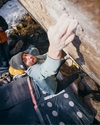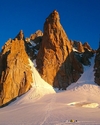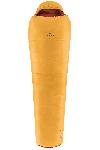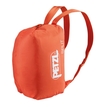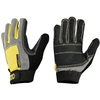Samuel Anthamatten and his love for freeride
It was Samuel himself who spoke to the RSI (Swiss radio broadcaster) about this totalising love, on the eve of Evolution Vertical event organized by New Rock and scheduled to take place in Lugano Palazzo dei Congressi at 20:30 (info: newrocksport.ch). Samuel will be joined by the highly talented Sean Vilanueva, Nicolas and Olivier Favresse, the protagonists of Vertical Sailing Greenland, their climbing campaign up Greenland's virgin big wall which netted them the Piolet d'or 2011, one of alpinism's the most prestigious awards.
"If you grow at the foot of the Matterhorn - explains Samuel - you inevitably have a strong relationship with the mountains. had I been born by the seaside, I would probably have become a skipper or a sailor. Not all those who live in Zermatt become guides though, some have never even climbed a 4000er. It's difficult to tell the difference between a guide born in the mountains and one who grew up in a city. I think though that those who were raised in the mountains are formed more, but with this though I don't want to say that those born in cities can't be good mountain guides."
The Matterhorn has been photographed millions of times, exploited to promote Zermatt, what's your relationship with this mountain if you see it every day?
"For me, the Matterhorn is a big amusement park, where I can do anything I want. I can go mountaineering, ski, climb huge faces, free climb. When I'm in Zermatt I don't think about the Matterhorn, it's part of my everyday life. Then I happen to see some tourists taking photographs of it and I say to myself: wow! Living in Zermatt one certainly gets used to this mountain, it's almost a habit. Many tourists dont even reckon you can climb the Matterhorn. For them it's a poster mountain, used for advertising. For me it's different, there are things that bind me to the Matterhorn, my relationship with this mountain is different and privileged."
You are known above all for being one of the best freeriders in the world, but you started out climbing, like your brother Simon who is three years older than you. Would it be right to state that, in some respects, climbing was enforced on you?
"A little, yes. I started climbing as an eight-year old boy. At that age the only thing you're interested in is playing, having fun, making mischief. Over time I became more interested in climbing, as did my brother Simon. I don't think it would be right to say that he forced me to climb, even though it's true that in the beginning I climbed because I saw him. I am happy that he encouraged me to start this sport."
One could say that you are the artist of the family, the less conventional brother and perhaps because of you desire to "bend the rules", of being creative, that at some point you embarked on becoming a freerider?
"I think every one of us is creative, an artist, in his or her particular field. Simon prepares things with extreme meticulousness. He focuses on a project and sees it through to its logical conclusion. In climbing you have to be creative when you decide on a sequence of moves which allow you to climb up a face. You have to decide how to move and waste as little energy as possible. I on the other hand am far more dispersive. In freeride there's an extreme search for creativity, I dedicated myself completely to off-piste skiing and, yes, maybe it's true, I've become creative when it comes to choosing a line of descent."
When did you realise that freeriding was just the right thing for you?
"When you live in Zermatt, skiing is a part of your DNA. I always liked skiing off-piste, ever since childhood. I really enjoyed leaving the pistes where the tourists skied. At one point in life I realized that the freeriding had taken over. There was a time when climbing and freeriding were just as important, but then - in a natural manner - off-piste skiing got the upper hand. I certainly haven't abandoned climbing, but I think I'm much more inclined to freeriding and its rewards are also greater."
Freeride means more freedom to do what you do?
"No, I don't think so. Even in climbing you have a lot of freedom. I can't comprehend sports where you can't express and implement your own ideas. This would mean being tied down, experiencing a sport in a limited manner. Freedom is an essential element for progress."
When a family has three brothers who all do competitive sports, is there any danger that you seek out the extreme, at any cost?
"We've never compared ourselves. When I climb with Simon, it's clear that he's the best. I climb, too, but he's more talented. If we go ski mountaineering, Martin is the best and we can only follow in his tracks and admire him. We can't and shouldn't make comparisons. Each of us is a specialist in his own particular field."
In ski mountaineering a stopwatch defines who's the best in a race, while in climbing routes are graded according to their difficulty. What factors determine the best freerider?
"There is no such thing as THE best freerider. There are some extreme skiers who have a perfect style. When you see you see them ski down a slope, when you see them blend into the environment, playing with mountain features... well this is beautiful, even for a spectator. In freeride - even though there are competitions and rules which must be followed - the evaluation depends on the judges and not on a timer. Let me explain myself better: when Usain Bolt sets a world record in athletics, the time states that he was the fastest, the best at a given distance. In climbing, freeriding or bouldering you simply can't do that because the time isn't of essence."
Earlier on you mentioned the quest for freedom, but you've taken part in competitions. Isn't this a paradox? Do you consider yourself someone who needs competitions?
"I do not think I'm an extreme competitor. Having said that, I've taken part in rock climbing and ice climbing competitions, as well as freeride comps, so what I've said is paradoxical. I too need confirmations. "
The entire proceeds of the Lugano evening will go towards young talented Swiss alpinists. What's it like for those who decide to make a living out of alpinism here in Switzerland?
"I think there are many talented young rock climbers, but in Switzerland only five or six athletes manage to make a living as a pro from this sport. In freeriding it's a bit better because there's more media attention and sponsors consequently are more interested in supporting us. We are still a long way off from the the salaries of football or ice hockey players. We're on a completely different planet compared to them!"



 1 / 4
1 / 4
 Copia link
Copia link
 archivio Samuel Anthamatten
archivio Samuel Anthamatten

